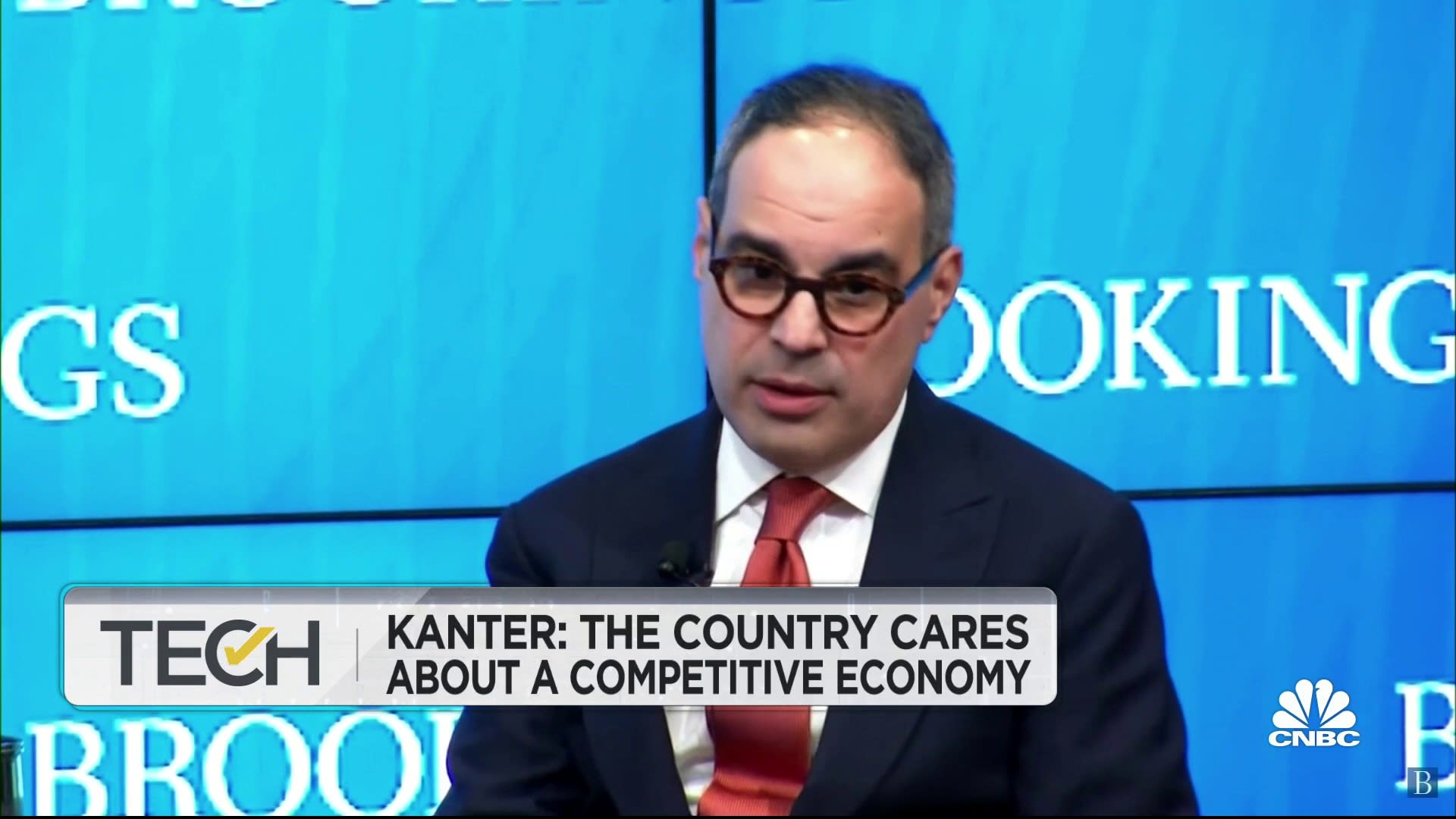FTC's Defense Takes Center Stage In Meta Antitrust Case

Table of Contents
The FTC's Core Arguments Against Meta's Monopoly Power
The FTC's core argument centers on Meta's alleged abuse of monopoly power in the social networking market. They contend that Meta's dominance isn't simply the result of superior innovation but rather a consequence of anti-competitive practices designed to stifle competition and maintain its stranglehold. Key accusations include:
-
Stifling Competition: The FTC argues that Meta leverages its immense market share and network effects to proactively eliminate potential competitors. This includes aggressively pursuing and integrating smaller, emerging social media platforms.
-
Anti-competitive Acquisitions: The acquisitions of Instagram and WhatsApp are central to the FTC's case. They claim these weren't merely strategic business decisions but rather calculated moves to neutralize burgeoning rivals before they could pose a serious threat to Meta's dominance. The FTC likely points to internal documents and emails demonstrating an intention to eliminate potential competition.
-
Data and Algorithm Manipulation: The FTC alleges that Meta uses its vast troves of user data and sophisticated algorithms to create insurmountable barriers to entry for new competitors. This includes targeted advertising strategies that make it incredibly difficult for smaller platforms to attract and retain users. This argument focuses on how Meta's control over data gives them an unfair competitive advantage.
-
Network Effects as a Weapon: The FTC likely emphasizes the powerful network effects inherent in social media platforms. They argue that Meta leverages these effects – the idea that a platform's value increases exponentially with the number of users – to cement its monopoly, making it nearly impossible for newcomers to gain traction.
-
Impact on Innovation and Consumer Choice: Finally, the FTC's argument rests on the assertion that Meta's monopolistic practices stifle innovation and limit consumer choice. Without effective competition, users are deprived of the benefits of a vibrant and dynamic social media landscape.
Meta's Counterarguments and Legal Strategies
Meta's defense is multi-pronged, centering on claims of innovation, consumer benefits, and challenges to the FTC's evidence and jurisdiction. Their key arguments include:
-
Innovation and Consumer Benefits: Meta argues that its acquisitions, such as Instagram and WhatsApp, ultimately benefited consumers by integrating valuable services and features into their existing ecosystem. They emphasize continuous product development and improvements as evidence of their commitment to innovation.
-
Competitive Landscape: Meta argues that the social media landscape is far from monolithic, pointing to the existence of other platforms like TikTok, Twitter (now X), Snapchat, and others, as evidence that the market isn't truly dominated by a single entity.
-
Pro-competitive Acquisitions: Meta's defense likely contends that its acquisitions were pro-competitive moves, leading to improvements in user experience, increased competition in related markets, and enhanced innovation.
-
Legal Challenges: Meta's legal strategy will likely involve challenges to the FTC's evidence, arguing against the FTC's market definition and questioning the validity of their methodology. They may challenge the FTC's jurisdiction or the sufficiency of the evidence to support claims of anti-competitive behavior.
Key Witnesses and Evidence Presented in the Case
The FTC vs. Meta case hinges on extensive evidence and expert testimony.
-
Key Witnesses: Both sides will call upon economists, data scientists, and legal experts to support their arguments. The FTC's witnesses will likely focus on demonstrating Meta's anti-competitive actions, while Meta's witnesses will counter with evidence of innovation and competition.
-
Types of Evidence: The case will rely heavily on internal Meta documents, communications, market analysis data, user data, and expert reports. The FTC’s case likely relies on internal documents revealing strategic decisions to acquire or neutralize competitors.
-
Significance of Evidence: The significance of key pieces of evidence, such as internal emails or market share analyses, will be crucial in determining the outcome. The judge's interpretation of this evidence will be paramount.
-
Data Privacy Concerns: The use and handling of user data will play a significant role, as data privacy concerns are intertwined with the accusations of anti-competitive behavior. The FTC might argue that Meta's data practices are part of its strategy to maintain its market dominance.
The Role of Section 2 of the Sherman Act
The FTC's case relies heavily on Section 2 of the Sherman Act, which prohibits monopolization and attempts to monopolize. To prove a violation, the FTC must demonstrate:
- Monopoly Power: Meta possesses monopoly power in a relevant market.
- Exclusionary Conduct: Meta engaged in exclusionary conduct that maintained or enhanced its monopoly power.
- Anti-competitive Effects: This conduct had anti-competitive effects, such as reduced innovation or higher prices for consumers.
Defining the "relevant market" in the context of the digital economy presents significant challenges, a core argument likely presented by both parties. Determining whether the market is just social networking, or encompasses a broader sphere of online communication, is critical to the FTC's case.
Conclusion
The FTC's antitrust case against Meta is a landmark legal battle with significant implications for the future of digital markets and the regulation of Big Tech. The outcome will heavily influence how future antitrust cases against large tech companies are handled. The FTC's defense, focusing on the alleged anti-competitive actions and market dominance, is crucial to the case's trajectory. The arguments presented by both sides regarding market definition, innovation, and consumer benefits are critical to the judge’s decision.
Call to Action: Stay informed on the developments in this crucial FTC vs. Meta antitrust case. Further analysis of the FTC's defense and Meta's counterarguments will be critical in understanding the long-term effects of this legal battle on the digital landscape. Follow our updates to stay informed on the latest developments in this important Meta antitrust case.

Featured Posts
-
 Formula 1 Yeni Sezon Takvim Sueruecueler Ve Beklentiler
May 20, 2025
Formula 1 Yeni Sezon Takvim Sueruecueler Ve Beklentiler
May 20, 2025 -
 D Wave Quantum Qbts Stock Decline Thursday Reasons And Analysis
May 20, 2025
D Wave Quantum Qbts Stock Decline Thursday Reasons And Analysis
May 20, 2025 -
 Analiza Pregovora Putin Tadic I Skriveni Ciljevi
May 20, 2025
Analiza Pregovora Putin Tadic I Skriveni Ciljevi
May 20, 2025 -
 Jalkapallo Friisin Avauskokoonpanossa Yllaetyksiae Kamara Ja Pukki Vaihtopenkillae
May 20, 2025
Jalkapallo Friisin Avauskokoonpanossa Yllaetyksiae Kamara Ja Pukki Vaihtopenkillae
May 20, 2025 -
 Non Perdere L Occasione Hercule Poirot Ps 5 A Meno Di 10 E Su Amazon
May 20, 2025
Non Perdere L Occasione Hercule Poirot Ps 5 A Meno Di 10 E Su Amazon
May 20, 2025
